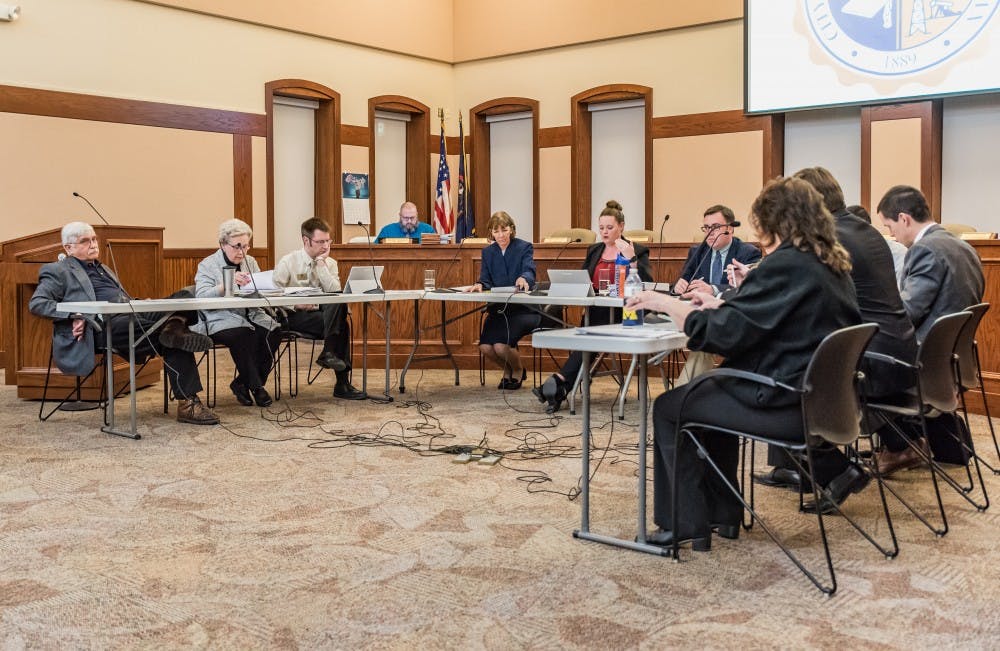City Commission passes resolution in support of local march, work session on Medical Marijuana Facilities Ordinance draft

City Commission members discuss zoning ordinances for medical marijuana facilities on March 12 at Mt. Pleasant City Hall.
Swimming pool regulations and a local march against gun violence were among the topics discussed by the Mount Pleasant City Commission at a March 12 meeting.
The commission also discussed a Medical Marijuana Facilities Ordinance draft during a work session. Commissioner Kristin LaLonde was absent.
March For Our Lives
City Commission passed a resolution supporting the local March For Our Lives event that will take place at 1 p.m. March 24 at Island Park. The local event will be part of a national demonstration that was created by survivors of the school shooting in Parkland, Florida and is meant to bring attention to gun violence and gun control.
Brandon Darsow, one of the nine co-organizers of the local march, came to the meeting to promote the event.
“The point of our march, unlike the broader March For Our Lives movement, is not to push specifically for gun control or reform – our point is to create and facilitate healthy conversation,” Darsow said.
The march will end at City Hall, 410 W. Broadway St., where a staging area will be set up for speakers.
Bus shelter
Several community members, including Executive Director of Isabella County Transportation Commission, Rick Collins, spoke out against the removal of a roofed structure that serves as a bus stop, located on the south side of Broadway Street.
The proposed plan would remove the bus shelter and replace the road-side area with parallel parking spaces. The idea was proposed due to the I-Ride bus system no longer having a regular route to the downtown area.
Collins provided data that showed that particular bus shelter was I-Ride’s third most visited stop.
He also pointed out the reserved road-side space is necessary for assisting people with disabilities and wheelchairs, because it allows space for ramps and equipment. Adding parallel parking spaces there will make access more difficult due to lack of space, Collins said.
“The thought was that if people are getting picked up at Motorless Motion, Marty’s Bar, the Brass (Café and Saloon), or wherever it is – the library – then is the bus shelter necessary, because people are waiting in buildings,” Mayor Allison Quast-Lents said. “But we certainly didn’t have the information we have now.”
Swimming pools ordinance
The commission had a public hearing on an ordinance to amend the regulation of private swimming pools. The current regulations don’t comply with state and federal laws.
The amendment specifically deals with the drainage of swimming pools, which may contain chemicals, such as chlorine.
The ordinance recommends the preferred method of draining pools is to use the sanitary sewer system. In this case, the individual would likely have to set something up to direct the water inside their home.
Two alternative options include individuals slowly draining their pools into their own yards or getting a special permit that would allow drainage into the storm sewer system. The latter is the least preferred because the water would drain directly into the river.
The ordinance passed in a four to two vote, with Commissioners Lori Gillis and Tony Kulick opposing.
Work session
A second work session, following the first work session on Feb. 12, for the Medical Marijuana Facilities ordinance draft, ended with little resolution. Among the discussed topics were annual fees, civil infraction violations, the lottery and vetting system for applications and the buffer zone around Central Michigan University.
Commissioners were tasked with creating a fine that would accompany a civil infraction violation of the ordinance for the first offense, second offense and so on.
However, the commissioners had a hard time agreeing on amounts. Commissioner Will Joseph was comfortable with $50 for a first offense, but no more than $5,000.
Gillis thought $50 was too low, but agreed $5,000 was too much for a first offense.
Kulick viewed $50 as too low and was opposed to the idea of the first offense being a warning.
Concerning the facilities application process, the commission discussed setting up the lottery system — which decides who will receive licenses from the city — to favor local residents over non-residents who apply.
They also asked the city staff to rewrite the language concerning the buffer zones, that limit where facilities can be. Currently, they have decided on a 1,000 foot buffer for K-12 schools and 500 feet for Central Michigan University.
However, the language was unclear as to whether that meant any, and all, university owned buildings, or if the buffer would extend from property lines. The commissioners did decide that the CMU Global Campus building located on Industrial Drive, would not be included in the buffer.
A few commissioners — Joseph and Kathy Ling — were also in favor of eliminating the Central Michigan University buffer to the east, to allow for facilities along Mission Street.
After the Medical Marijuana Facilities Ordinance draft is reviewed by the Planning Commission, there will be a hearing on it. The tentative date for the hearing is May 3.



